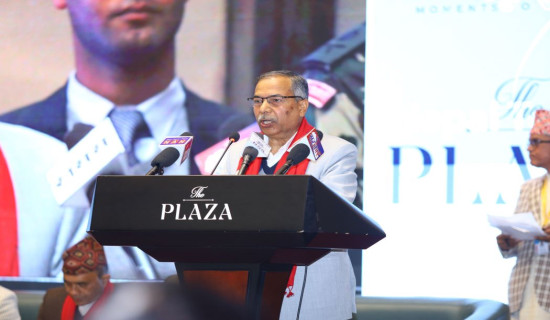- Thursday, 18 December 2025
Ancestral occupation of Majhi, Bote threatened
By Bom Lal Giri,Nawalpur, Aug. 7: From mid-July, members of the indigenous fishing communities – Majhi, Musahar and Bote – inhabiting several areas of Nawalpur district, also known as Nawalparasi East, start fishing in the Narayani River.
A rule about fishing allows fishing in the region around the Chitwan National Park only between mid-July to mid-April.
However, despite the communities earning their livelihood by fishing for centuries, they say that they are now unwillingly ready to give up their ancestral occupation and start afresh.
According to them, it was getting harder and harder to survive with the occupation of fishing. "We would be happy to leave fishing if the government managed an alternative source of earning for us," they echoed.
Representatives of the communities said that the government was liable to address their demands as it is because of the authorities that they had to decide on leaving their traditional occupation passed for generations.
A license is required for fishing in the Narayani River, the major fishing source for the communities in Nawalpur. "Fishing without a license is difficult. However, even those with a license face several problems as unwanted gifts from the Chitwan National Park's security personnel," said Man Bahadur Musahar, a resident of Naya Basti, a settlement in Ward No. 13 of Kawasoti Municipality in the district.
"Nepali Army personnel in the national park have a simple rule for us. Either we have to give up the fishing net or leave the fish we captured," Man Bahadur added.
Naya Basti has 35 households belonging to the members of Musahar community.
"There are around 30 youths from the households who go fishing. Of them, only six have a license. Others have applied for a license for long but have not received it yet," said Bir Bahadur Musahar, a local.
Bir Bahadur stressed that the youths were bound to take risks and go fishing secretly as they had to survive.
"Majority of the youths in our community are uneducated. They have no other skills than fishing. What is the problem in giving them the license to fish?" questioned Bir Bahadur.
Locals informed that 32 individuals from the fishing communities of four wards of Kawasoti had applied for the license. Of them, only 14 have received the license so far.
"There are around 1,600 members of the Majhi and Musahar communities and 1,800 members of the Bote community in Nawalpur. The traditional occupation of all of these individuals is fishing," said Hom Bahadur Majhi, a local.
Nevertheless, the communities see no quality future in fishing.
"We will stop fishing if the government helps us with an alternate occupation. We would like to work in government offices, but we are also ready to do vegetable farming and animal husbandry if supported," said Manarjani Musahar, chairperson of a local cooperative.
Manarjani exclaimed that the communities of Majhi, Musahar and Bote were dissatisfied with the country's representatives as no solution has been sought for their problems.
"The problems would have been sought if they were known. There is no one to speak on our behalf," said Manarjani.
Several conditions to fish
According to the fishermen, they have to abide by several conditions to get a fishing license.
Firstly, despite having a branch office of the national park in Nawalpur, individuals need to visit the office in Kasara of Chitwan to apply for a fishing license.
"There are 10 conditions we should accept for fishing. It includes fishing only between 6 am to 5 pm, not using plastic fishing nets and fishing only between mid-July to mid-April, among others," a fisherman with a fishing license said.
If the conditions are disobeyed, the fishing license is terminated at once.
However, the communities argued that they were harassed unnecessarily by park officials even while fishing by meeting the set conditions.
Dream to fish without restrictions once again
The fishing communities used to fish more freely until a decade ago.
An article titled "Indigenous Fishing Communities in Chitwan Area" published by the ICIMOD quotes an elderly of the Majhi community saying, " It was like a heaven.
We used to be free. We could hunt, make boats, and fish freely."
According to the fishing communities, they would not have had to demand for an alternate occupation if they were allowed to fish without conditions and unnecessary troubles from the authorities.
"We can earn a handsome income if we are allowed to fish freely. We know the limitations because we respect nature," said Sunil Majhi, a youth who was returning after selling fish he caught recently.
"A kilogram of fish costs Rs. 500 to Rs. 700. An individual can catch and sell six to seven kilograms of fish daily if allowed to fish properly and return with the catch," said Majhi.















